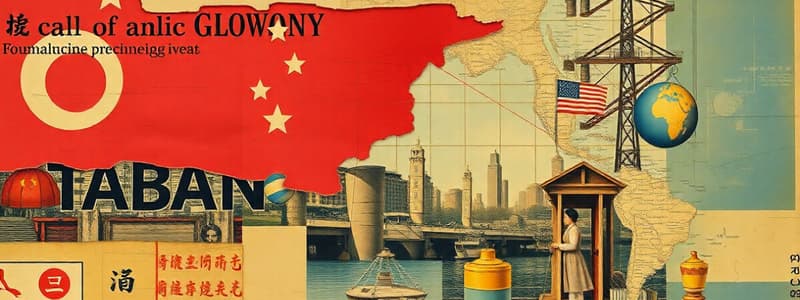Podcast
Questions and Answers
What percentage of traded goods do agricultural products represent?
What percentage of traded goods do agricultural products represent?
- 5%
- 10% (correct)
- 20%
- 15%
Which category of goods has seen the most significant increase in export share from developing countries over the past 50 years?
Which category of goods has seen the most significant increase in export share from developing countries over the past 50 years?
- Agricultural products
- Services
- Minerals
- Manufactured goods (correct)
What is one reason the United States relies less on international trade compared to other countries?
What is one reason the United States relies less on international trade compared to other countries?
- More frequent border crossings
- Less economic power
- Higher agricultural exports
- A larger size and diversity of resources (correct)
Which of the following factors does NOT affect the value of trade between two countries according to the gravity model?
Which of the following factors does NOT affect the value of trade between two countries according to the gravity model?
Why do Canada and Mexico rank as the United States’ biggest commercial partners?
Why do Canada and Mexico rank as the United States’ biggest commercial partners?
Which aspect of geography affects trade by making transportation and trade easier?
Which aspect of geography affects trade by making transportation and trade easier?
What general trend has occurred in the export composition of developing countries over the past 60 years?
What general trend has occurred in the export composition of developing countries over the past 60 years?
In a gravity model of trade, what commonly influences transportation costs?
In a gravity model of trade, what commonly influences transportation costs?
What is a significant downside of protectionism?
What is a significant downside of protectionism?
What does Export Oriented Industrialization (EOI) primarily focus on?
What does Export Oriented Industrialization (EOI) primarily focus on?
What role does competition play in the context of clusters according to Marshall?
What role does competition play in the context of clusters according to Marshall?
Which of the following best describes vertical collective actions?
Which of the following best describes vertical collective actions?
In a mixed ISI – EOI strategy, what significant factor does the timing and speed of change affect?
In a mixed ISI – EOI strategy, what significant factor does the timing and speed of change affect?
What is the main benefit of collective action for small businesses?
What is the main benefit of collective action for small businesses?
Which type of enterprise model is represented by companies like Samsung and Hyundai?
Which type of enterprise model is represented by companies like Samsung and Hyundai?
What aspect of competition is emphasized in the content?
What aspect of competition is emphasized in the content?
Before the industrial revolution, craft workshops were primarily characterized by which of the following?
Before the industrial revolution, craft workshops were primarily characterized by which of the following?
What is one potential consequence of a government adopting an EOI strategy?
What is one potential consequence of a government adopting an EOI strategy?
What type of collective action involves the sharing of knowledge and workforce training?
What type of collective action involves the sharing of knowledge and workforce training?
In the context of Guangdong’s cluster, what fraction of global toy production occurs in Chenghai?
In the context of Guangdong’s cluster, what fraction of global toy production occurs in Chenghai?
What limitation might affect Special Economic Zones (SEZs) in a mixed EOI strategy?
What limitation might affect Special Economic Zones (SEZs) in a mixed EOI strategy?
Which type of enterprise is characterized by state ownership and control, such as China National Petroleum?
Which type of enterprise is characterized by state ownership and control, such as China National Petroleum?
What does multilateral collective action primarily focus on?
What does multilateral collective action primarily focus on?
How does competition affect the innovation process according to the content?
How does competition affect the innovation process according to the content?
What is structural change primarily concerned with?
What is structural change primarily concerned with?
Which of the following best describes international economics?
Which of the following best describes international economics?
What challenge can arise from rapid structural changes in an economy?
What challenge can arise from rapid structural changes in an economy?
What has been a significant trend in U.S. exports and imports over the past 60 years?
What has been a significant trend in U.S. exports and imports over the past 60 years?
What percentage of world trade consists of manufactured goods as of a 2017 study?
What percentage of world trade consists of manufactured goods as of a 2017 study?
What aspect does international finance primarily focus on?
What aspect does international finance primarily focus on?
Which of the following describes a potential government strategy during structural changes?
Which of the following describes a potential government strategy during structural changes?
Which economic factor became notably impacted by the recession in 2009?
Which economic factor became notably impacted by the recession in 2009?
What concept introduced by David Ricardo allows countries to engage in win-win international exchanges?
What concept introduced by David Ricardo allows countries to engage in win-win international exchanges?
How did Adam Smith perceive the function of the market in society?
How did Adam Smith perceive the function of the market in society?
What term describes the conflict between the industrial bourgeoisie and the urban proletariat, according to Karl Marx?
What term describes the conflict between the industrial bourgeoisie and the urban proletariat, according to Karl Marx?
Which model suggests that the productivity of labor is fundamental for explaining international trade?
Which model suggests that the productivity of labor is fundamental for explaining international trade?
In the context of Marx's theories, what did he consider necessary for managing conflicts between the bourgeoisie and the proletariat?
In the context of Marx's theories, what did he consider necessary for managing conflicts between the bourgeoisie and the proletariat?
What major social transformation occurred as a result of the Industrial Revolution, according to the content?
What major social transformation occurred as a result of the Industrial Revolution, according to the content?
What does the Heckscher-Ohlin model examine in addition to technology?
What does the Heckscher-Ohlin model examine in addition to technology?
What was the impact of the English Revolution of 1688-89 on the Industrial Revolution?
What was the impact of the English Revolution of 1688-89 on the Industrial Revolution?
What was Alfred Marshall's contribution to the field of economics?
What was Alfred Marshall's contribution to the field of economics?
According to Keynes, what is the role of the state during a crisis?
According to Keynes, what is the role of the state during a crisis?
What does Marshall suggest about cooperatives in terms of production organization?
What does Marshall suggest about cooperatives in terms of production organization?
In 'The Economic Consequences of the Peace,' what does Keynes warn against?
In 'The Economic Consequences of the Peace,' what does Keynes warn against?
What concept did Keynes critique in his 'General Theory of Employment, Interest and Money'?
What concept did Keynes critique in his 'General Theory of Employment, Interest and Money'?
What does Marshall's idea of organization of production contribute to?
What does Marshall's idea of organization of production contribute to?
What is emphasized in the political economy of production?
What is emphasized in the political economy of production?
What does Keynes argue is necessary for achieving stable employment levels?
What does Keynes argue is necessary for achieving stable employment levels?
Flashcards
Smith's Theory of Wealth
Smith's Theory of Wealth
The idea that nations are wealthier due to increased specialization and market size, creating an "invisible hand" of economic forces.
Absolute Advantage
Absolute Advantage
The ability of a country to produce a good or service using fewer resources than another country.
Comparative Advantage
Comparative Advantage
The principle stating that countries can benefit from trade even if they don't have absolute advantages, by specializing in what they are relatively better at producing.
Class Conflict in Capitalism
Class Conflict in Capitalism
Signup and view all the flashcards
Capitalism and Imperialism
Capitalism and Imperialism
Signup and view all the flashcards
Proletarian Revolution
Proletarian Revolution
Signup and view all the flashcards
Industrial Revolution
Industrial Revolution
Signup and view all the flashcards
Specialization and Trade
Specialization and Trade
Signup and view all the flashcards
International Division of Labour
International Division of Labour
Signup and view all the flashcards
Political Economy of Production
Political Economy of Production
Signup and view all the flashcards
International Trade
International Trade
Signup and view all the flashcards
Shift from Political Economy to Economics
Shift from Political Economy to Economics
Signup and view all the flashcards
Keynesian Economics
Keynesian Economics
Signup and view all the flashcards
Market Failure
Market Failure
Signup and view all the flashcards
Fiscal Policy
Fiscal Policy
Signup and view all the flashcards
Government Intervention
Government Intervention
Signup and view all the flashcards
Structural Change
Structural Change
Signup and view all the flashcards
Special Economic Zones (SEZs)
Special Economic Zones (SEZs)
Signup and view all the flashcards
International Economics
International Economics
Signup and view all the flashcards
International Finance
International Finance
Signup and view all the flashcards
Balance of Payments
Balance of Payments
Signup and view all the flashcards
Exchange Rate
Exchange Rate
Signup and view all the flashcards
International Policy Coordination
International Policy Coordination
Signup and view all the flashcards
Export Oriented Industrialization (EOI)
Export Oriented Industrialization (EOI)
Signup and view all the flashcards
Import Substitution Industrialization (ISI)
Import Substitution Industrialization (ISI)
Signup and view all the flashcards
Mixed ISI-EOI Strategy
Mixed ISI-EOI Strategy
Signup and view all the flashcards
Corporations (American Model)
Corporations (American Model)
Signup and view all the flashcards
Zaibatsu (Japanese Model)
Zaibatsu (Japanese Model)
Signup and view all the flashcards
Chaebols (Korean Model)
Chaebols (Korean Model)
Signup and view all the flashcards
State-Owned Enterprises (SOEs)
State-Owned Enterprises (SOEs)
Signup and view all the flashcards
Craft Enterprises (Pre-Industrial Revolution)
Craft Enterprises (Pre-Industrial Revolution)
Signup and view all the flashcards
Competition vs. Cooperation in Clusters
Competition vs. Cooperation in Clusters
Signup and view all the flashcards
What is a Cluster?
What is a Cluster?
Signup and view all the flashcards
External Economies of Scale
External Economies of Scale
Signup and view all the flashcards
Vertical Collective Action
Vertical Collective Action
Signup and view all the flashcards
Horizontal Collective Action
Horizontal Collective Action
Signup and view all the flashcards
Multilateral Collective Action
Multilateral Collective Action
Signup and view all the flashcards
Guangdong's Cluster
Guangdong's Cluster
Signup and view all the flashcards
Collective Action
Collective Action
Signup and view all the flashcards
Gravity Model of Trade
Gravity Model of Trade
Signup and view all the flashcards
Reliance on International Trade
Reliance on International Trade
Signup and view all the flashcards
Shifting Composition of Developing Country Exports
Shifting Composition of Developing Country Exports
Signup and view all the flashcards
Changing Composition of World Trade
Changing Composition of World Trade
Signup and view all the flashcards
Cultural Affinity and Trade
Cultural Affinity and Trade
Signup and view all the flashcards
Geography and Trade
Geography and Trade
Signup and view all the flashcards
Multinational Corporations and Trade
Multinational Corporations and Trade
Signup and view all the flashcards
Borders and Trade
Borders and Trade
Signup and view all the flashcards
Study Notes
Economic Growth and Development in East Asia
- Asia will contribute 70% of global growth, with China being the main driver (around 35%)
- The World Economic Outlook highlights this contribution
- The theories of growth and development from the West are being applied to countries in East Asia (e.g., Japan, China, South Korea)
- There is debate on whether these theories apply equally to East Asian nations and how these theories influence them.
Trade Openness
- The graph shows the development of trade openness since the birth of capitalism and the industrial revolution.
- Trade openness experienced a peak around 1915, then had a significant drop between WWI and WWII.
- A consistent upward trend in trade openness began in the 1990s and continued until the 2008 financial crisis.
- The 2020 Covid-19 pandemic also impacted the trend, causing a slight slowdown.
History of Economic Thought – Adam Smith
- Smith's work founded the study of economic systems
- Political Economy, a unified discipline, developed from moral philosophy
- Smith's key publications include: "The theory of moral sentiments" (1759), and "An inquiry into the nature and causes of the wealth of nations" (1776).
- Smith observed the shift from a feudal society to a capitalist society and described the concept of a "market economy", where equal individuals exchange property rights.
- The "invisible hand" of the market was a concept Smith introduced to show how self-interest in the economy benefits society by driving a more efficient distribution of goods and services.
History of Economic Thought – David Ricardo
- Ricardo introduced the concept of comparative advantage, which allows countries to mutually benefit from trade.
- Comparative advantage means that countries should specialize in goods they can efficiently produce with relatively less labor input compared to other countries.
- International exchanges of goods are possible and beneficial even between countries where one country has no absolute advantage in producing any good compared to the other.
History of Economic Thought – Karl Marx
- Karl Marx analyzed the conflict between the bourgeoisie (capitalist class) and the proletariat (working class) in an industrial society.
- He argued that perpetual global growth is necessarily coupled with conflicts between early-stage and late-stage capitalist countries, as well as conflicts between capitalists and working class inside countries.
- The class struggle in capitalism is the central dynamic, and conflict is unavoidable.
- Marx believed that the ultimate solution was the proletarian revolution and transition to communism, which would resolve the underlying conflict and create a more equitable society.
History of Economic Thought – Alfred Marshall
- Alfred Marshall was a key figure in the Neoclassical or Marginalist revolution.
- Economists shifted away from political economy towards a more scientific and objective approach.
- Economics was redefined for the study of choice and supply and demand in markets by individual agents.
- He focused on organization of production on local and regional levels (instead of the national level).
Growth vs. Development
- Growth is a means to achieve development, which is the final objective.
- Economic development involves a multidimensional expansion of human capabilities, not just economic output.
GDP (Gross Domestic Product)
- The market value of newly produced goods and services in a country during a specific period.
- It is used as a basic metric to evaluate the performance of a country, but it misses items that cannot be valued as part of the market, like household work, and quality of life and leisure factors.
Human Development
- Development should focus on expanding capabilities and functionings of each individual.
- It is multidimensional (consider things like capabilities and entitlements, not just monetary measures).
- Key figures in this school of thought include Amartya Sen
Poverty and Inequality
- Poverty and inequality have been consistent issues of concern in economics
- The gap between the richest 1% and the rest of the population is a valid topic of concern and possible research area.
- Globalization's impact on cost and benefit distribution is a field for research.
International Economics
- International economics studies national interactions in trade, finance, and investments.
- The topic includes international trade (that focuses on transactions of goods, services, and money), as well as international finance (involving monetary transactions).
U.S. Exports and Imports
- U.S. Exports and Imports are an increasingly important part of the U.S. economy, growing substantially over the past 60 years, however, they both declined during the 2009 recession and 2020 pandemic.
- The composition of world trade is dominated by manufactured goods.
Borders and Trade
- Formal processes for crossing borders (like customs and currency) add costs that influence trade.
- Distance, transaction costs, and exchange of currency all play important roles in the trade between countries
International Capital Markets
- Capital markets are arrangements for exchanging money now for promises of future payment.
- International financial markets include foreign investments and regulations surrounding the transactions.
Enterprise Models and Organization of Production
- Different models of business organization exist (e.g., corporations, zaibatsu, chaebols, cooperatives).
- Enterprise groups and clusters are types of organization associated with economies where there are lower costs to coordinate and conduct trades.
- Enterprise groups are structured in different forms, like informal networks, global value chains, captive networks, and relational networks, all of which influence transaction costs within the organization.
- Hierarchical organization of production is a mechanism for controlling costs in enterprises.
- Cooperation and competition can be complementary. Businesses can benefit from collective action in addition to competition.
- Industrial districts are geographically concentrated business areas that are crucial for production organization post-Industrial Revolution.
- Various benefits arise from clustering, such as lower production costs, access to skilled labor, and knowledge sharing.
External Economies
- External economies are sources of benefits stemming from agglomeration of industries in a particular place, such as the shared knowledge among enterprises and the proximity of suppliers and customers.
- External economies (pecuniary and technological) arising from the cluster are beneficial features.
Industrial Policy
- Industrial policy is a set of government actions to influence the development of industries.
- The purpose is to coordinate structural change towards specific long-term economic and social goals.
Studying That Suits You
Use AI to generate personalized quizzes and flashcards to suit your learning preferences.




